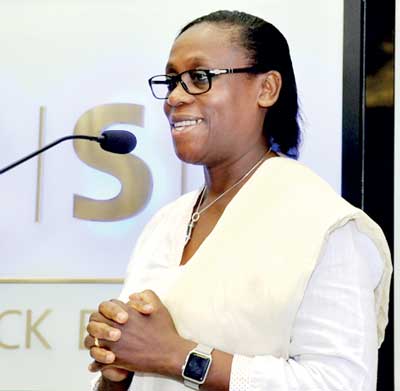Monday Feb 23, 2026
Monday Feb 23, 2026
Thursday, 9 March 2017 00:00 - - {{hitsCtrl.values.hits}}
World Bank Country Director Sri Lanka and Maldives Dr. Idah Z. Pswarayi-Riddihough ringing the bell for gender equality at the CSE yesterday – Pic by Lasantha Kumara
Following is the speech made by the World Bank Country Director, Sri Lanka and Maldives Dr. Idah Z. Pswarayi-Riddihough at yesterday’s Colombo Stock Exchange ceremony of ringing the bell for gender equality to mark the International Women’s
Day 2017
A very warm good morning to everyone and happy International Women’s Day! I am honored to have been given the opportunity to say a few words. I would also like to take the opportunity to thank the Colombo Stock Exchange for organising this event, which I understand has now become a tradition. 
Although a lot of progress has been made towards enabling more women to rise to the top, the glass ceiling is still in fact, quite intact. While many companies are now working to close the gender gap in business leadership and management through financing skills development, training and investing in pipeline development, the challenge remains. It is one of the reasons Goal #5 of the UN’s sustainable development goals (SDG) – achieve gender equality and empower all women and girls – also known as the stand-alone gender goal was developed. The economic case for gender equality is now well justified.
Gender equality is also central to the World Bank Group’s own goals of ending extreme poverty and boosting shared prosperity in a sustainable manner. The World Bank Group’s Gender Strategy for 2016-2023 outlines the support to client countries and companies to achieve greater equality and empowerment of women and girls.
It’s now well understood that gender equality is also about changing the norms and expectations about female and male roles, and ultimately changing power relations. No society can develop sustainably without transforming the distribution of opportunities, resources and choices for males and females so that they have equal power to shape their own lives and contribute to their families, communities, and countries.
The private sector increasingly recognizes that transforming the way companies do business by a reduction of gender gaps and leadership means better talent, more productivity, more diverse leadership, more customers, and a stronger bottom line. Promoting gender diversity and equity is key to retaining skilled talent. The higher the level at work that women attain the better and more inclusive the decision making process becomes. In particular, board-level diversity allows for a wider range of experiences being drawn on for better decision-making.
Women in emerging markets are entering the job market more qualified and in greater numbers than their male counterparts. Although women and men have similar levels of education and enter the workforce in fairly equal numbers, the number of women in senior management positions is substantially lower. While the absolute number of women at work is important; it is in itself not the means to an end. What women are doing in the workplace is just as important. Women need to be present in sufficient numbers at senior levels to drive cultural change and better business results.
Having said all this, I don’t want to leave the impression that gender equality is all a negative story. There are equally many good stories and there could even be more. I would like to highlight a few things that could be done to accelerate its attainment:
For governments: Encourage and enforce conducive work place environments for women; offer child care; decrease and eliminate pay gaps; and require disclosures of board compositions to demonstrate to stakeholders the contribution that diversity can make to performance.
For companies: Improve board nomination processes to cast a wider net in the search for directors beyond the comfort zone – familiarity and like mindedness. Deliberately search for diversity and diverse opinions. Women now represent a growing proportion of the consumer base, and a female presence on a board could help ensure that a company’s objectives reflect the customers and markets served.
For women: Women should develop the expertise to be among the best qualified in the field they have chosen. They should not be afraid of demonstrating their capacity; nor of defending their ability for managerial positions.
For families: Change the mindset that family care responsibilities are only for women. Better gender equality needs to start in the home!
To all women, men, families, employers; I hope that you will celebrate this year’s International Women’s Day with a commitment to personally get involved.